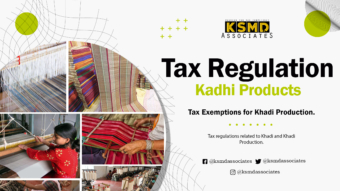Khadi, a hand-spun and hand-woven fabric, has been an important part of India’s cultural heritage for centuries. During India’s independence movement, Mahatma Gandhi popularised khadi as a symbol of self-sufficiency and economic independence. Khadi production continues to play an important role in the Indian economy today, employing millions of people. In this article, we will look at the tax regulations that apply to khadi and khadi production in India.
Contents
- Tax exemptions for khadi production.
- GST Rate for Khadi Products
- Tax implications for khadi sellers
- State-level tax exemptions
- Conclusion
Tax Exemptions for Khadi Production
The Indian government recognises the importance of khadi production in the Indian economy and has provided various tax exemptions and incentives to encourage the growth of this sector. The exemption of GST on khadi and khadi products is one of the most significant tax benefits. This means that there is no GST levied on the manufacture, sale, or purchase of khadi and khadi products. This exemption applies to all khadi products, including clothing, accessories, and home décor.
In addition to the GST exemption, khadi producers are eligible for a number of other tax exemptions and benefits. Khadi production units, for example, are eligible for income tax exemptions under Section 80IB of the Income Tax Act. This provision allows khadi production units to deduct up to 100% of their profits for a period of five years from the year of production’s start.
Furthermore, khadi production units are eligible for customs duty exemptions on imported khadi machinery and equipment. This exemption covers all machinery and equipment, including spinning wheels, handlooms, warping machines, and dyeing machines.
Tax Implications for Khadi Sellers
While khadi producers benefit from various tax exemptions and exemptions, khadi sellers are subject to the same tax rules as any other business. Khadi sellers, like any other business, must register for GST and collect GST on their sales. The GST rate for khadi products, on the other hand, is zero, which means that no GST is payable on the sale of khadi products.
Khadi vendors must also file regular GST returns and keep proper books of accounts. Failure to meet these obligations may result in penalties and legal action from the tax authorities.
State-level Tax Exemptions
Finally, the Government of India has recognised the importance of khadi production in the Indian economy and has provided various tax exemptions and incentives to encourage the growth of this sector. Khadi production units are exempt from GST, customs duty, and income tax, whereas khadi sellers are subject to the same tax regulations as any other business. The tax exemptions and incentives for khadi production are aimed at promoting self-reliance, economic independence, and sustainable development, and they have played a crucial role in the growth and success of the khadi sector in India.
Fill Your GST / Income Tax Return?
With Expert Guidance
document.getElementById( "ak_js_1" ).setAttribute( "value", ( new Date() ).getTime() );
The tax exemptions and incentives for khadi production are intended to promote self-sufficiency, economic independence, and long-term development. They have been critical to the growth and success of India’s khadi sector. While khadi producers benefit from various tax exemptions and exemptions, khadi sellers are subject to the same tax rules as any other business. To avoid penalties and legal action from tax authorities, all stakeholders in the khadi sector must follow tax regulations.
Conclusion
The Government of India has recognised the importance of khadi production in the Indian economy and has provided various tax exemptions and incentives to encourage the growth of this industry. Khadi manufacturing units are exempt from GST, customs duties, and income tax, whereas khadi sellers are subject to the same tax regulations as any other business. State governments also provide additional tax exemptions and incentives to khadi manufacturing companies. Tax exemptions and incentives for khadi production are intended to promote self-sufficiency, economic independence, and long-term development, and they have played an important role in the growth and success of the industry.


Add a Comment